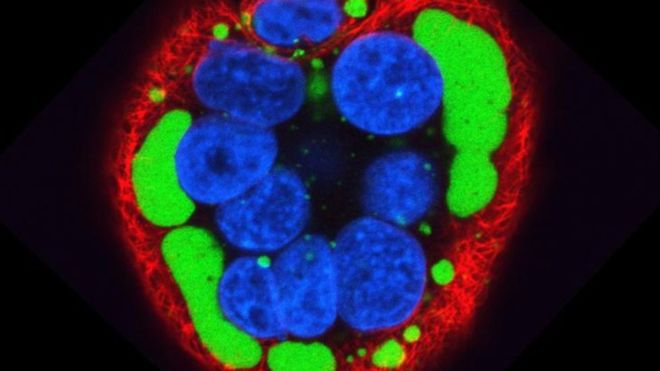Scientists have destroyed the UK’s laboratory stocks of a virus that once caused devastating cattle losses.
These stocks accounted for most of the world’s lab samples of rinderpest, which were held at The Pirbright Institute in Surrey.
Rinderpest and the deadly smallpox virus are the only diseases to have been eradicated from the face of the Earth.
BBC News had exclusive access to the destruction of the final samples.
Dr Carrie Batten, from The Pirbright Institute, described the moment as “the end of an era”.
“Rinderpest was devastating and by removing the stocks that are held globally you are essentially reducing the risk dramatically,” she said.
Dr Michael Baron, honorary fellow at the institute, said the end of rinderpest would mark the beginning of a new war on other diseases.
“The success we have achieved with rinderpest has been one of the main drivers for people saying we can do this with other animal diseases and other human diseases such as polio, mumps and measles. These diseases are eradicable and this should be done,” he explained.
Human catastrophe
The rinderpest virus is responsible for one of the worst catastrophes in history. During an outbreak in the 1890s, it killed between 80% and 90% of cattle in eastern and southern Africa. This caused mass starvation in the region.
Millions of people died as a result. In Ethiopia alone, one-third of the human population was wiped out. The toll in lives was on a scale matched only by the Black Death in Europe.
A vaccination campaign eventually brought the disease under control until it was declared to have been eradicated in the wild in 2011.
But thousands of samples of the virus remained in 40 laboratories across 36 countries. If there happened to be an accident, the disease could potentially leak out and cause devastation once again.
To prevent this, the UN Food and Agriculture Organization (FAO) and the World Organization for Animal Health (OIE) approved a few highly secure labs and encouraged other institutes to send their rinderpest samples to these facilities.
Among them is the Pirbright Institute in Surrey, which has led efforts to record the genetic information contained in each sample and then destroy it.
Researchers have been reluctant to destroy lab samples of deadly viruses in case they are needed to create a vaccine should the disease ever re-emerge. But a digital record of the virus’s genetic code means that this is no longer an issue.
And so Pirbright has been able to destroy all its samples which account for most of the laboratory rinderpest virus in the world.
Dr Samia Metwally, of the FAO, hopes that Pirbright’s success will encourage other holding facilities to follow suit so that it is completely eliminated from the face of the Earth.
“This is a huge step by Pirbright. It sets a precedent for other countries to do the same.”
Dr Monique Eloit, the OIE’s director-general, told BBC News that she was “very happy” about the development.
“All the work done by farmers, veterinarians and scientists for such a long time is on track to minimise the risk of the re-emergence of rinderpest,” she said.
The government’s chief vet,




